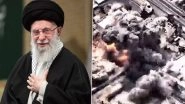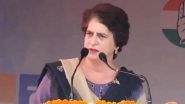Moscow, Jan 22 (AP) The Kremlin on Friday welcomed U.S. President Joe Biden's proposal to extend the last remaining nuclear arms control treaty between the two countries, which is set to expire in less than two weeks.
Russian President Vladimir Putin's spokesman, Dmitry Peskov, said that Russia stands for extending the pact and is waiting to see the details of the U.S. proposal.
The White House said Thursday that Biden has proposed to Russia a five-year extension of the New START treaty.
“We can only welcome political will to extend the document,” Peskov said in a conference call with reporters. “But all will depend on the details of the proposal.”
The treaty, signed in 2010 by President Barack Obama and Russian President Dmitry Medvedev, limits each country to no more than 1,550 deployed nuclear warheads and 700 deployed missiles and bombers, and envisages sweeping on-site inspections to verify compliance. It expires on February 5.
Russia has long proposed to prolong the pact without any conditions or changes, but former President Donald Trump's administration waited until last year to start talks and made the extension contingent on a set of demands.
The talks stalled, and months of bargaining have failed to narrow differences.
“Certain conditions for the extension have been put forward, and some of them have been absolutely unacceptable for us, so let's see first what the U.S. is offering,” Peskov said.
Mikhail Ulyanov, the Russian ambassador at the international organizations in Vienna, also hailed Biden's proposal as an “encouraging step.”
“The extension will give the two sides more time to consider possible additional measures aimed at strengthening strategic stability and global security,” he tweeted.
The Russian Foreign Ministry's spokeswoman, Maria Zakharova, noted in a statement that Russia always has called for maintaining the treaty and said Russian diplomats are ready to quickly engage in contacts with the U.S. to formalize its extension for five years “without any delay.”
U.N. Secretary-General Antonio Guterres welcomed the U.S. decision and Russia's reiteration. He encouraged both countries “to work quickly to complete the necessary procedure for the New START's extension before the February 5 expiration and move as soon as possible to negotiations on new arms control measures," U.N. spokesman Stephane Dujarric said.
“A five-year extension would not only maintain verifiable caps on the world's two largest nuclear arsenals but will also provide time to negotiate new nuclear arms control agreements to grapple with our increasingly complex international environment," Dujarric said.
Biden indicated during the campaign that he favored the preservation of the New START treaty, which was negotiated during his tenure as U.S. vice president.
The talks on the treaty's extension also were clouded by tensions between Russia and the United States, which have been fueled by the Ukrainian crisis, Moscow's meddling in the 2016 U.S. presidential election and other irritants.
Despite the extension proposal, White House press secretary Jen Psaki said Biden remains committed to holding Russia “to account for its reckless and adversarial actions,” such as its alleged involvement in the Solar Winds hacking event, 2020 election interference, the chemical poisoning of opposition figure Alexei Navalny and the widely reported allegations that Russia may have offered bounties to the Taliban to kill American soldiers in Afghanistan.
Asked to comment on Psaki's statement, Peskov has reaffirmed Russia's denial of involvement in any such activities.
After both Moscow and Washington withdrew from the 1987 Intermediate-Range Nuclear Forces Treaty in 2019, New START is the only remaining nuclear arms control deal between the two countries.
Arms control advocates have strongly called for New START's preservation, warning that its lapse would remove any checks on U.S. and Russian nuclear forces.
Last week, Russia also declared that it would follow the U.S. to pull out of the Open Skies Treaty allowing surveillance flights over military facilities to help build trust and transparency between Russia and the West.
While Russia always offered to extend New START for five years — a possibility envisaged by the pact — Trump asserted that it put the U.S. at a disadvantage and initially insisted that China be added to the treaty, an idea that Beijing flatly rejected.
Trump's administration then proposed to extend New START for just one year and also sought to expand it to include limits on battlefield nuclear weapons.
Moscow has said it remains open for new nuclear arms talks with the U.S. to negotiate future limits on prospective weapons, but emphasized that preserving New START is essential for global stability.
Russian diplomats have said that Russia's prospective Sarmat heavy intercontinental ballistic missile and the Avangard hypersonic glide vehicle could be counted along with other Russian nuclear weapons under the treaty.
The Sarmat is still under development, while the first missile unit armed with the Avangard became operational in December 2019.
The Russian military has said the Avangard is capable of flying 27 times faster than the speed of sound and could make sharp maneuvers on its way to a target to bypass missile defense systems.
It has been fitted to the existing Soviet-built intercontinental ballistic missiles instead of older type warheads, and in the future could be fitted to the more powerful Sarmat. (AP)
(The above story is verified and authored by Press Trust of India (PTI) staff. PTI, India’s premier news agency, employs more than 400 journalists and 500 stringers to cover almost every district and small town in India.. The views appearing in the above post do not reflect the opinions of LatestLY)













 Quickly
Quickly


